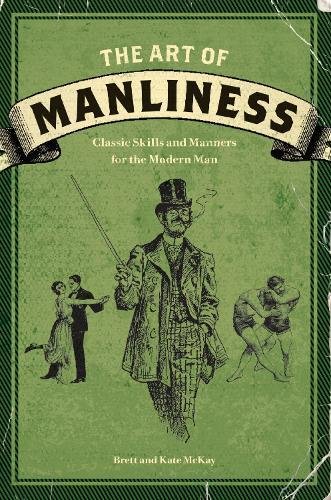Am I the only boy who secretly dreamed of becoming a hobo? Riding the rails, traveling across the country, and carrying everything you own on your back has a romance that appeals to every man’s desire to wander.
In a 1937 issue of Esquire magazine, an anonymous writer penned an article called “The Bum Handbook.” Unlike most bums, he had chosen his vagabond lifestyle. And he was tired of seeing the sub-par job most other bums were doing. This was during the Great Depression, and many men found themselves homeless, lost, and ignorant of the art of bumliness. The author had being a hobo down to a science and claimed to enjoy 3 meals a day and a comfortable place to sleep each night. While he didn’t desire to return to regular society, he knew that most fellow hobos did, and so he offered these tips in hopes they could maintain confidence and a respectable look and thus find their way back to steady work.
 The Art of Manliness: ...
Best Price: $1.99
Buy New $7.70
(as of 12:35 UTC - Details)
The Art of Manliness: ...
Best Price: $1.99
Buy New $7.70
(as of 12:35 UTC - Details)
Although much has changed since the 1930s, if you by chance find yourself a hobo during this Great Recession or desire to become a bum by choice, perhaps you can learn some tips from hobos of old. Enjoy these excerpts from the article and this fun peek into the past.
 JanSport Superbreak Ba...
Buy New $29.95
(as of 04:25 UTC - Details)
JanSport Superbreak Ba...
Buy New $29.95
(as of 04:25 UTC - Details)
Keep yourself clean. Filthy men can’t charm the housewife into giving food, the passerby into relinquishing money, the man of business into giving jobs: the housewife is scared and repelled, the passerby is annoyed and anxious to be away, the business man responds curtly. And there is no need to be unwashed. Every gasoline station and railroad depot has a washroom replete with running water, soap and paper towels; anyone may use these facilities, the bum should wash and shave there. In the handbook for bums the first motto is: A bum should be clean.
Stay away from the cities. City people have submerged their humanity. I think the reason for this is their security from the elements, for the family that is sure of food and shelter becomes easily forgetful of other human beings’ needs and thinks vaguely of organized charities…The farm family, on the other hand, knows that deficit of sun or rain may touch more than its comfort, that the house it has built must be a citadel against cold and storms; therefore, their humanity comes more quickly to their mouths and hands. I do not say that city dwellers cannot be “hit” with success, but it is more difficult and only among the poor ones have you a fair chance of receiving hospitality.
Avoid intermediaries. Direct appeal is the best: individual should appeal directly to individual. Once I remember speaking to some soldiers in a town that had only two restaurants. When it was time to eat they insisted on going into one of the restaurants with me and pleading my case with the proprietor. There was much whispering and finally after some minutes the proprietor said, “All right, I’ll give him reduced rates.” Reduced rates and I didn’t have a cent in my pockets! I thanked my well-meaning friends, went into the other restaurant alone, and received a bounteous meal. I am sure that had I spoken to that first man myself, I would have had no trouble obtaining food. Another time, because of the solicitude of some CCC boys, I found myself without a bed at three o’clock in the morning: they had insisted that I sleep at their camp five miles away, and when I had arrived, their superior objected strongly.
August 21, 2010





